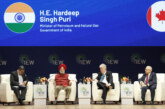On Verge of Collapse
By Dr Arvind Kumar
Many experts feel that in the second decade of the 21st century the global community faces grave insecurities in three areas: the environment, conflict, and the economy. The intertwining nature of these problems makes them all the more severe; the beguiling view propagated by power-holders that they are temporary aberrations makes them all the more difficult to address. Environmental insecurity emanates from the epic flooding across Australia, Brazil, the Philippines and elsewhere. This inundation, in combination with several weather disasters of 2010, can plausibly be seen as part of an increasingly energetic global climatic system that reflects the absorption of more solar energy. This is very much a signpost for the much greater impacts that will follow from climate change.
The insecurity from conflict is discernible from the ongoing war in Afghanistan and Pakistan. Even more significant is the degree of public support in Pakistan for Malik Mumtaz Qadri, who assassinated the governor of Punjab, Salmaan Taseer, on 4 January. The fact that this action, motivated by the governor’s backing of reform of the country’s blasphemy laws, can be openly endorsed by young educated professionals (such as lawyers) is an uncompromising indication of social attitudes in the country; in turn these relate to the widespread opposition to western military actions in the region, such as armed-drone attacks in Pakistan itself.
In the realm of economy, the international financial crisis too continues, with the eurozone at its heart. Portugal’s emergency bond-issue and the decisions by China and Japan to buy eurobonds in order to support the currency, reflect the desperate crisis-management approach of leading governments and institutions. But the real focus is the rising social unrest elsewhere as a result of economic dislocation, unemployment and social frustration.




